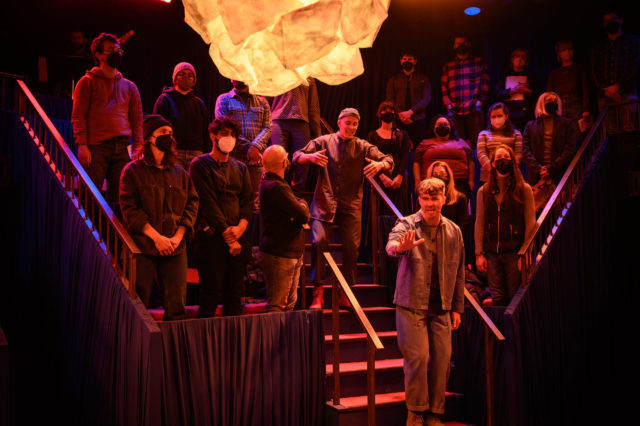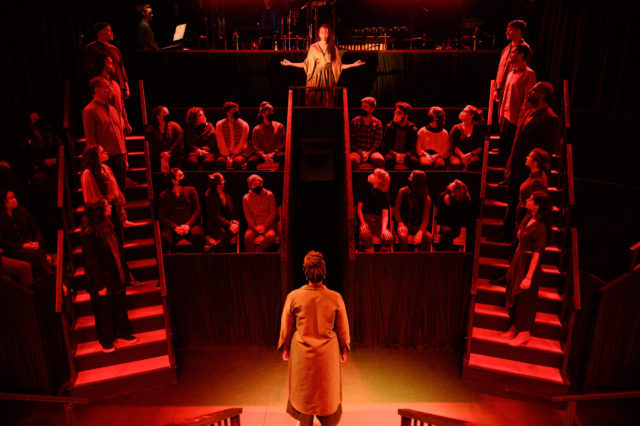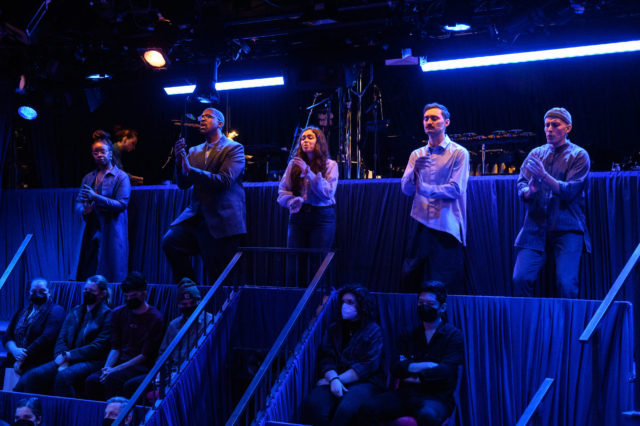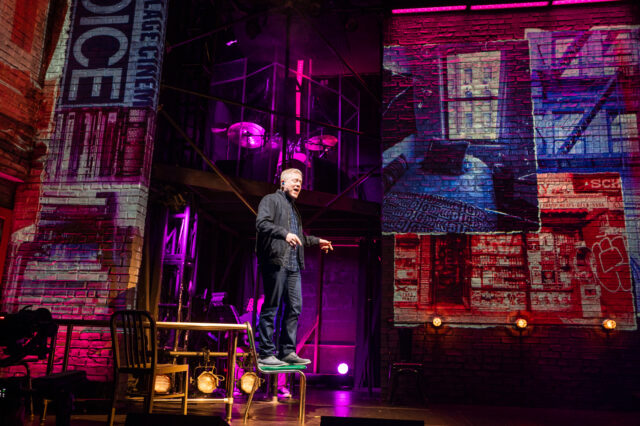
Anthony Rapp’s one-man show details the development of Rent (photo by Russ Rowland)
ANTHONY RAPP’S WITHOUT YOU
New World Stages
340 West Fiftieth St. between Ninth & Tenth Aves.
Wednesday – Monday through June 11, $110-$399
withoutyoumusical.com
newworldstages.com
Anthony Rapp’s Without You is a sweet-natured, heartfelt true story about life’s ups and downs, about love, exhilaration, and loss, told by an engaging entertainer, even if it doesn’t go quite as deep as we might want it to.
Actor and singer Rapp was born in October 1971 in Chicago and raised with his older brother and sister in Joliet, Illinois, by their mother; his parents divorced when he was two. He knew from an early age that he wanted to be a performer; his big break came when, in September 1994, he got an audition for a show described as “a new rock opera based on La Bohème about a group of friends in the East Village,” to be workshopped for four weeks at New York Theatre Workshop. The semiautobiographical musical was called Rent, by little-known composer and lyricist Jonathan Larson (Superbia, Tick, Tick . . . Boom!). Adapted from Rapp’s 2006 memoir, Without You: A Memoir of Love, Loss, and the Musical “Rent,” and first presented in 2012, the ninety-minute Without You follows the development of Rent — which turned out to be one of the most popular musicals of all time — alongside the concurrent illness of Rapp’s beloved mother.
In 1994, Rapp was working at Starbucks and sharing an apartment in the East Village with his brother, Adam, who would go on to become a successful playwright, director, screenwriter, and novelist (The Sound Inside, Blackbird). Anthony checked in regularly with his mother, who had always been supportive of “Tonio” and his career. In Without You, Rapp discusses meeting Larson, “a young curly-haired guy, with ears that stuck out a bit” who believed he was “the future of musical theater.” He talks about hanging out and working with his Rent colleagues, which included actors Adam Pascal and Daphne Rubin-Vega and director Michael Grief, and sings tunes from the show in addition to his audition song and several originals he wrote with David Matos and Joe Pisapia.
As the buzz around Rent and Larson’s tragic fate grows to deafening heights, Rapp, who plays Mark Cohen in the show, has to balance the success with his mother’s failing health. “I’ve known / All of my life / If I ever lost my way / She’d carry me home / She loved to / Carry me home,” he sings wistfully.
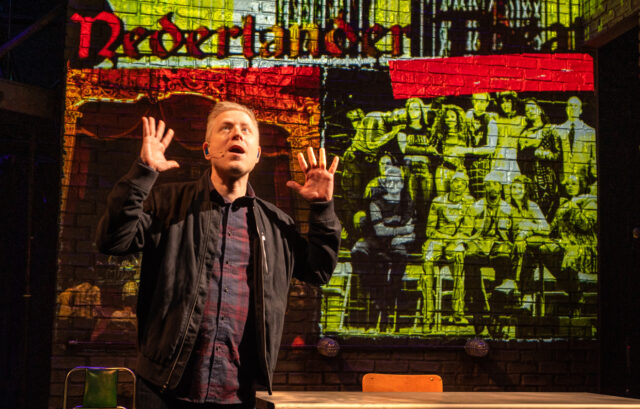
Anthony Rapp sings and shares personal stories in Without You at New World Stages (photo by Russ Rowland)
Set and lighting designer Eric Southern has transformed the stage into a cramped downtown New York apartment, complete with exposed brick walls and a fire escape. The five-piece band — cellist Clérida Eltime, bassist Paul Gil, drummer Jerry Marotta, guitarist Lee Moretti, and music director, orchestrator, and keyboardist Daniel A. Weiss — are situated in three separate places, including a few that seem to be under ever-present New York City scaffolding. David Bengali’s projections include photographs Rapp took during the Rent rehearsal process. The costumes are by Angela Vesco, with sound by Brian Ronan and additional arrangements by Tom Kitt.
Director Steven Maler (Suburbia, Starfuckers!) doesn’t add too much razzle-dazzle as Rapp walks across the stage sharing his story; he jumps on a table belting out one song and often talks to empty chairs that represent those people he has lost. He affects different accents for the various people in his life, from his mother to Jonathan to Jonathan’s parents. Understandably, he makes no mention of his sexual abuse allegations against Kevin Spacey, nor does he delve into other parts of his life (he is now engaged and has a child) and career, which comprises more than seventy-five appearances on film, television, and stage; most notably, he has been on Broadway in If/Then and You’re a Good Man, Charlie Brown and, since 2017, has portrayed Lt. Paul Stamets on Star Trek: Discovery.
As likable and kindhearted as Rapp is, Without You lacks the necessary dramatic tension to lift it to the next level. While some of the tidbits he offers about Larson are appealing, most of them are not new, regardless of whether you’ve read Rapp’s book. The majority of the songs are well executed, but Rapp’s own “Wild Bill,” in which he dons a cowboy hat and stands in front of projections of the West, is too silly. And as touching as his relationship with his mother is, it’s not heavy enough to carry half the show.
As he sings in the title song from Rent, “How can you generate heat / When you can’t feel your feet? . . . / How do you leave the past behind / When it keep finding ways to get to your heart / It reaches way down deep and tears you inside out / ’Til you’re torn apart.” Without You is plenty heartfelt, but it won’t tear your insides out or generate heat the way Rent itself did.
